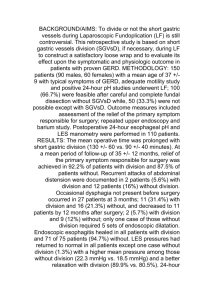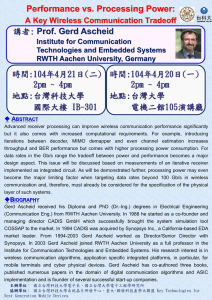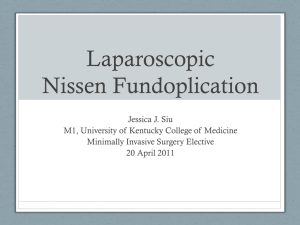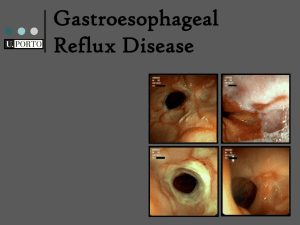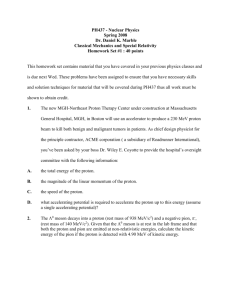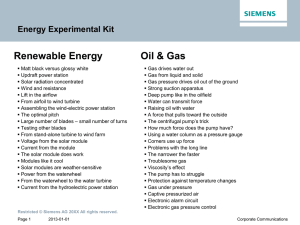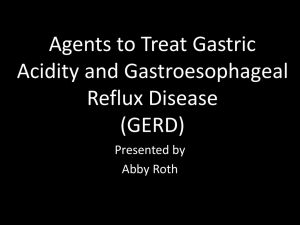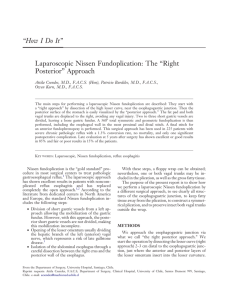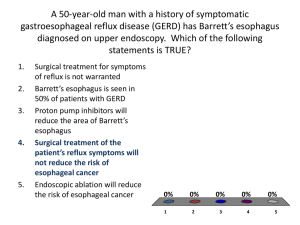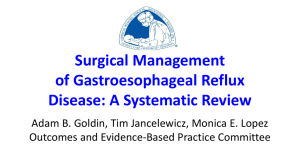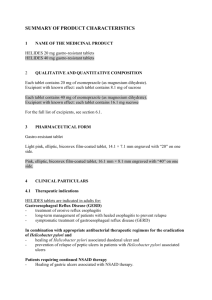(GERD) treatment - ND Center for Nursing
advertisement
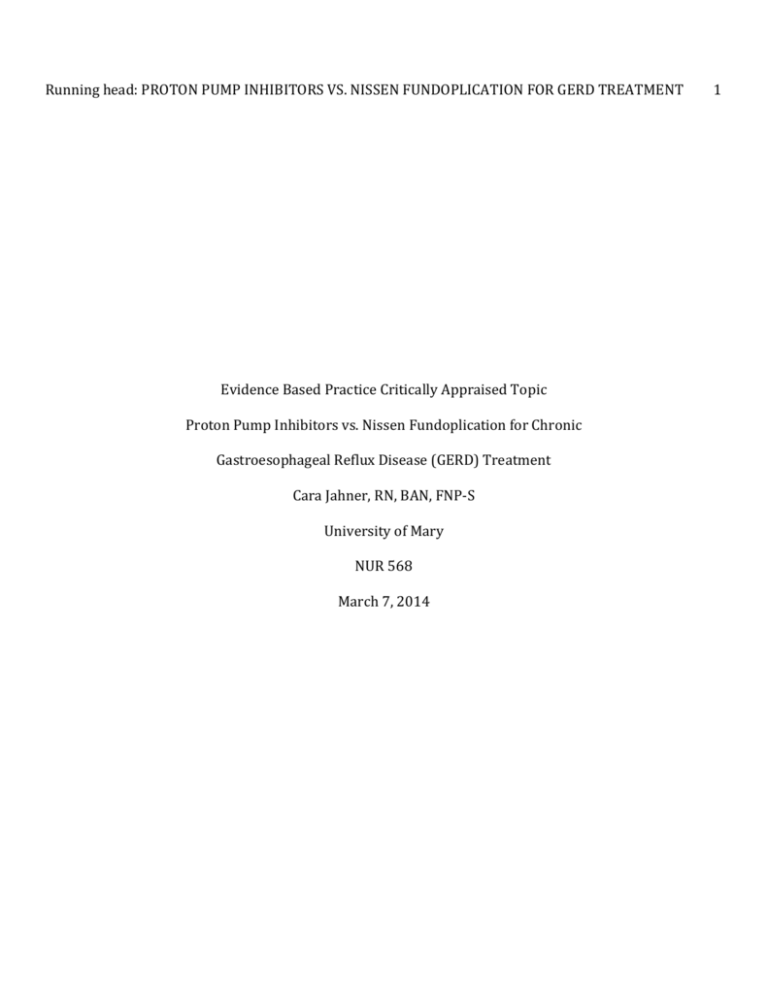
Running head: PROTON PUMP INHIBITORS VS. NISSEN FUNDOPLICATION FOR GERD TREATMENT Evidence Based Practice Critically Appraised Topic Proton Pump Inhibitors vs. Nissen Fundoplication for Chronic Gastroesophageal Reflux Disease (GERD) Treatment Cara Jahner, RN, BAN, FNP-S University of Mary NUR 568 March 7, 2014 1 Proton Pump Inhibitors VS. Nissen Fundoplication for Chronic GERD Treatment 2 Evidence Based Practice Critically Appraised Topic Proton Pump Inhibitors vs. Nissen Fundoplication for Chronic Gastroesophageal Reflux Disease (GERD) Treatment Cara Jahner, RN, BAN, FNP-S March 7, 2014 Clinical Scenario A 53 year old male is seen in the gastroenterology clinic that has been treating with omeprazole for chronic gastroesophageal reflux disease (GERD) for the past 5 years. He states that he occasionally has “flair- ups” of his GERD and was wondering what his long-term treatment options were for his GERD management. Clinical Question For adult patients with chronic gastroesophageal reflux disease (GERD), does a Nissen fundoplication improve GERD symptoms more than medical management with proton pump inhibitors? Articles Anvari, M., Allen, C., Marshall, J., Armstrong, D., Goeree, R., Ungar, W., & Goldsmith, C. (2011). A randomized controlled trial of laparoscopic Nissen fundoplication versus proton pump inhibitors for the treatment of patients with chronic gastroesophageal reflux disease (GERD): 3-year outcomes. Surgical Endoscopy, 25(8), 2547-2554. doi:10.1007/s00464-011-1585-5 Fiocca, R., Mastracci, L., Engström, C., Attwood, S., Ell, C., Galmiche, J., & ... Lundell, L. (2010). Long-Term Outcome of Microscopic Esophagitis in Chronic GERD Patients Treated With Esomeprazole or Laparoscopic Antireflux Surgery in the LOTUS Trial. American Journal Of Gastroenterology, 105(5), 1015-1023. doi:10.1038/ajg.2009.631 *Both articles found using Cochrane and Medline databases Summary and Appraisal of Key Evidence for Article 1 Proton Pump Inhibitors VS. Nissen Fundoplication for Chronic GERD Treatment 3 Anvari, Allen, Marshall, Armstrong, Goeree… and Goldsmith (2011), completed a level 1 evidence randomized controlled trial of adult patients with gastroesophageal reflux disease comparing proton pump inhibitors and Nissen fundoplication. At the start of the trial there were 180 adult patients, however 104 of them gave informed consent. There were 52 adults in the titration Proton pump inhibitor manager group and 52 in the surgical (Nissen fundoplication group). The GERSS tool was chosen to monitor epigastric pain, heartburn free days, and esophageal acid exposure, pH, and quality of life. At the 3-year follow up, the surgical patients found that they had more heartburn free days and a better quality of life. However, the acid exposure or pH monitoring was not significantly different from the groups. There was an 11.8% treatment failure in the surgical group and 16% treatment failure in the proton pump inhibitor group. At the 3-year follow up, only 93 of the 104 patients were available for review. This is considered a weakness and threat of the study. The strength of the study was the strict following of the GERSS tool, however the study did not mention what GERSS stood for. The authors did mention there is a debate about the differing opinions between medical management versus surgery; therefore it is recommended more research be completed on the topic. Summary and Appraisal of Key Evidence for Article 2 Fiocca, Mastracci, Engstrom, Attwood, Galmiche… and Lundell (2010) compiled a level 1 evidence LOTUS study that compare medical management with esomeprazole (titration 20- 40 mg orally) or laparoscopic anti-reflux surgery in the long-term treatment of chronic reflux disease over a 5 year period. There were randomized 266 adults in 11 European countries in the proton pump inhibitor (esomeprazole) group and 246 in the laparoscopic anti-reflux surgery group. Lesions in the distal esophagus were biopsied at 1, 3, and lastly at 5 years, along with a PH-metry test and a health related quality of life survey to monitor treatment and remission. In the esomeprazole group’s estimated GERD remission rates were 92% in the esomeprazole group and 85% in the laparoscopic anti-reflux surgery group. In the esomeprazole group at 5 years, 16% of patients complained of heartburn, 13% of acid regurgitation, 5% complained of dysphagia, 28% for bloating, and 40% for flatulence. These results are compared to the laparoscopic anti-reflux group of 8% heartburn, 2% acid regurgitation, 11% dysphagia, 40% bloating, and 57% flatulence. Positive Endoscopic findings were respectively the same in each group around 11%. The PPI group was able to decrease their average pH, where the surgical group maintained around the same pH. Proton Pump Inhibitors VS. Nissen Fundoplication for Chronic GERD Treatment 4 The strengths of this research study were the thoroughness of the testing and the number of participants. A weakness of the study was the lack of recommendations for the next study. Therefore there is an opportunity for more research. There could have been a threat to the research because there was a disclaimer about a possible conflict of interest, as one of the authors was on the LOTUS steering committee. Results and Clinical Bottom Line Both research studies proved that medical management with proton pump inhibitors and surgery can be effective for patients. The proton pump inhibitor group seems to be more effective at decreasing the bloating and discomfort, whereas the Nissen fundoplication group was more effective at relieving acid reflux and regurgitation. However, it is important to understand that there are known treatment failures for both the medical and surgical aspect of long term GERD treatment. Implication for practice This research has shown that either the proton pump inhibitors or Nissen fundoplication can be effective at the treatment of chronic GERD. If a patient has failed treatment of proton pump inhibitors or is running into complications of long term PPI treatment, such as Clostridium difficile, the practitioner and patient should consider the Nissen fundoplication for a treatment option. Also, if the patient is not interested in long term PPI use, the surgical route is also an option. Proton Pump Inhibitors VS. Nissen Fundoplication for Chronic GERD Treatment References Anvari, M., Allen, C., Marshall, J., Armstrong, D., Goeree, R., Ungar, W., & Goldsmith, C. (2011). A randomized controlled trial of laparoscopic Nissen fundoplication versus proton pump inhibitors for the treatment of patients with chronic gastroesophageal reflux disease(GERD): 3-year outcomes. Surgical Endoscopy, 25(8), 2547-2554. doi:10.1007/s00464-011-1585-5 Fiocca, R., Mastracci, L., Engström, C., Attwood, S., Ell, C., Galmiche, J., & ... Lundell, L. (2010). Long-term outcome of microscopic esophagitis in chronic GERD patients treated with esomeprazole or laparoscopic antireflux surgery in the LOTUS trial. American Journal Of Gastroenterology, 105(5), 1015-1023. doi:10.1038/ajg.2009.631 5
